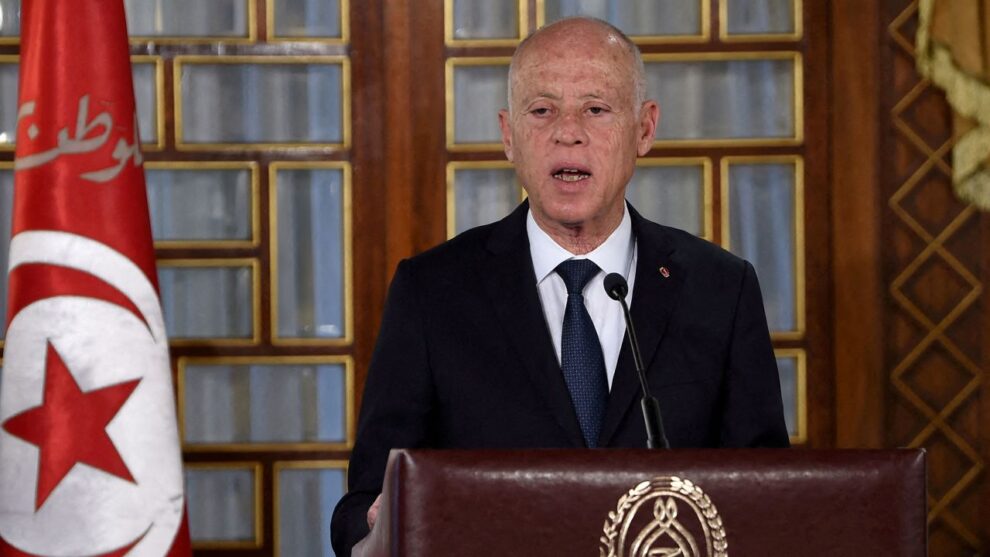Tunisian President Kais Saied’s almost two-week absence has raised questions about his health and succession in a country that has become increasingly authoritarian since he took power.
The 65-year-old president made no public appearances between March 22 and April 3, but resurfaced on Monday after media outlets, activists and the country’s opposition raised alarms about his “disappearance.”
In a video posted on the Tunisian presidency’s Facebook page, Saied was seen delivering a monologue to Prime Minister Najla Bouden, dispelling rumors about his health, including those of a stroke.
“(The rumors) had reached a level of insanity that we haven’t seen in Tunisia before,” the president said, adding that talk of a power vacuum had ulterior motives. “They (the opposition) want to create crisis after crisis… and to overthrow the authorities,” he said.
Despite his reappearance, the mystery of his whereabouts remains unsolved. The president repeatedly referred to his “temporary absence” in the 11-minute video but didn’t say what the cause of it was.
Whereas Saied downplayed his absence, analysts say it is cause for concern when the man who wields a multitude of powers is inexplicably absent for almost two weeks.
“He holds all the power so his whereabouts and state of health are of immense importance equally for those who support him and those who oppose and want to see him gone,” said Intisar Fakir, senior fellow and director of the North Africa and Sahel program at the Washington, DC-based Middle East Institute.
Former Tunisian Foreign Minister Rafik Abdessalem, from the opposition Ennahda party, tweeted on Saturday that the president had been lying in a military hospital “in an atmosphere of complete secrecy,” without saying how he got the information.
Asked by reporters about the president’s health, Tunisian Health Minister Ali Murrabit on Sunday walked away without commenting, according a video posted in local media.
Tunisia’s presidency didn’t respond to CNN’s request for comment.
Disappearances of heads of state are not uncommon in North African authoritarian regimes, said Monica Marks, a professor of Middle East politics at New York University Abu Dhabi who focuses on Tunisia. She noted that in neighboring Algeria, former President Abdelaziz Bouteflika, who was deposed in 2019 after mass protests, was not seen in public for years.
But Saied’s thirteen-day absence is a first for Tunisia in almost a decade, she said.
“This is the first time since Tunisa’s 2011 revolution for democracy that we have seen a head of state perform a disappearing act like this,” Marks told CNN. “But it is not at all surprising given Tunisia’s return to dictatorship.”
Once seen as the sole democracy to have emerged from the 2011 Arab Spring uprisings, Tunisia in July of last year passed a new constitution that cemented Saied’s one-man rule and was widely seen to have eliminated the last vestiges of democracy in the country. The president has referred to parliament as “an institution of absurdity” and a “state within a state.”
Ahmed Nejib Chebbi, the head of the National Salvation Front (NSF), a grouping of opposition movements, demanded on Monday that the government address concerns about the president’s health, stressing the dangers of a vacuum in the presidency given the powers that Saied has accumulated of late.
He decried the lack of a functioning system in place to ensure a smooth transfer of power should the president be incapacitated. “There is a constitutional gap… and we won’t sit back and watch while this vacuum is filled by one of the (foreign) powers,” he said.
There is currently no clear outline of how Tunisia would transfer power, even temporarily, should the president become incapacitated, analysts say.
“It is a giant, opaque mess,” Marks said, adding that the president has surrounded himself with “undemocratic acolytes who do not seem disposed to solving national problems through democratic elections.”
The North African country has been engulfed in an economic crisis that started with the Covid-19 pandemic and a political crisis since July 2021, when Saied dissolved the government and suspended parliament in what critics called a “coup.” But Tunisia lacks a unified opposition force, analysts say, given that the powerful UGTT union and the opposition are not aligned.
“Tunisia’s pro-democracy, anti-Saied opposition remains extremely disunited, fundamentally fractured,” Marks said.
There have however been attempts to band the opposition together against Saied and NSF leader Chebbi has previously called on the UGTT to coordinate with the opposition.
“If all Tunisians were against (Saied), there would have been more opportunity and willingness to mobilize and for other actors to join,” said Fakir of the Middle East Institute.
Source : CNN World
















